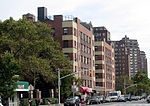E-flux
Arts organizationsPress release agenciesPublishing companies established in 1998Use mdy dates from January 2017
e-flux is a publishing platform and archive, artist project, curatorial platform, and e-mail service founded in 1998. The arts news digests, events, exhibitions, schools, journal, books, and art projects produced and/or disseminated by e-flux describe strains of critical discourse surrounding contemporary art, culture, and theory internationally. Its monthly publication, e-flux journal, has produced essays commissioned since 2008 about cultural, political, and structural paradigms that inform contemporary artistic production.
Excerpt from the Wikipedia article E-flux (License: CC BY-SA 3.0, Authors).E-flux
East Broadway, New York Manhattan
Geographical coordinates (GPS) Address Nearby Places Show on map
Geographical coordinates (GPS)
| Latitude | Longitude |
|---|---|
| N 40.714589 ° | E -73.982481 ° |
Address
East Broadway 311
10002 New York, Manhattan
New York, United States
Open on Google Maps







